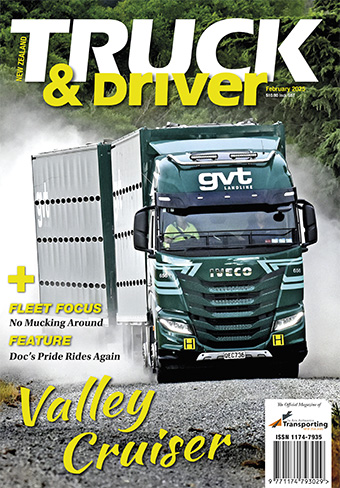Ia Ara Aotearoa Transporting New Zealand News


Mode neutrality goes out the window

THIS GOVERNMENT, AS SOON AS IT WAS elected, promised to be a government of change. Following a fairly slow first few months, we are now beginning to see what it meant by that – and for the road transport industry there are certainly going to be some challenging times ahead.
Now, don't for one minute think that I'm anti-change, as I'm not and – and, as a rule, neither should our industry be: The right kind of change can be a very good thing – and for incoming governments, especially after nine years in opposition, it's perfectly understandable that they want to come in and shake things up a little.
Having political parties enter Government looking to differentiate themselves from their predecessors and leave their own legacy is a healthy part of our democracy and should not be discouraged.
...THIS GOVERNMENT, AS SOON AS IT WAS elected, promised to be a government of change. Following a fairly slow first few months, we are now beginning to see what it meant by that – and for the road transport industry there are certainly going to be some challenging times ahead.
Now, don't for one minute think that I'm anti-change, as I'm not and – and, as a rule, neither should our industry be: The right kind of change can be a very good thing – and for incoming governments, especially after nine years in opposition, it's perfectly understandable that they want to come in and shake things up a little.
Having political parties enter Government looking to differentiate themselves from their predecessors and leave their own legacy is a healthy part of our democracy and should not be discouraged.
I'm actually of the opinion that the previous National Government, while an extremely competent manager and steward of our economy, was too cautious in its thinking – and not willing to spend its vast political capital on some of the longterm directional changes that New Zealand required. I'm thinking of things like Resource Management Act reform, streamlining our district health board system and addressing issues around land use and water quality.
Early indications are that this Government is not going to let itself fall into that trap. Certainly, in the area of land transport and the provision of infrastructure, this Government seems determined to create its own legacy. Whereas the previous Government broadly ran a programme that built on progress made by governments before it, Labour, NZ First and the Greens – under the leadership of Transport and Infrastructure Minister Phil Twyford – have opted for a complete change of course.
Where National prioritised the upgrade of important state highways, this Government is focused on behaviour change and trying to get people off the road and onto other forms of transport – namely trains, light rail, walking and cycling.
There is no question that in Auckland, in particular, better public transport must play a part in alleviating traffic congestion. However, the way the Government is going about it indicates that it has very little understanding of the importance of mode neutrality to our economy and the effect that bad policy can have on making the 'waka go slower.'
The Forum has made its representations pretty clear on these matters and has not held back in our assessment of the negative impact that the Government's policies will have on road transport and the broader economy.
By now, readers will be pretty familiar with the arguments for and against the Auckland regional fuel tax, so I won't go into that in too much detail. Needless to say, the Forum is strongly opposed to it: It's a poorly thought-out, inefficient and regressive policy that contains so many loopholes and work-arounds that its revenue-gathering benefits can only politely be described as overstated.
Unfortunately, it's also a desperately unfair piece of legislation, because – unlike our industry, which must pass cost increases on – the private motorist can't do that, so will end up being stung twice. Firstly on the fuel they use and secondly on the products they buy.
Due to the amount of media coverage given to the regional fuel tax, the fact that the Government intends to turn KiwiRail into an approved public organisation for the purposes of accessing road user taxes has fallen below the radar a little bit. This however, is a really big deal and potentially has a far bigger impact on our industry than the fuel tax will.
The gist of the policy is that the Government proposes amending the governing provisions of the National Land Transport Fund (NLTF) beyond the present scope of passenger rail service subsidies by introducing a legislative amendment that would result in an increased dependency of rail on public funding, across the board. This would categorise KiwiRail as an approved public organisation, allowing it to access the NLTF for the purpose of operating in the commercial market alongside alternative transport providers.
Transport providers would therefore end up subsidising their competition. That is a perverse and unfair outcome and is an anathema to road freight operators who operate in a highly competitive commercial environment and compliantly pay road user charges into the NLTF.
If it is the Government's intention to use a higher proportion of the NLTF for urban passenger rail then this proposed change is unnecessary. Rail-based passenger transport is operated on behalf of Auckland Transport and regional councils, who are already authorised recipients of the NLTF. If, however, it is the Government's intention to fund KiwiRail capital works and rail freight operations from road user taxes….then we have serious concerns. Such action would totally contradict the Government's stated policy of 'mode neutrality.'
One mode would in essence be cross-subsidising another competing mode – creating serious pricing and investment distortions to the detriment of NZ road transport businesses and the wider economy.
If KiwiRail is to receive funding from the NLTF then surely a 'rail user charge,' comparable to the mass/distance road user charge, should be introduced to maintain the integrity of the Fund and a semblance of neutrality.
In the Forum's view there are two key planks to successful transport policy:
- Investment in any transport mode should be based on true comparative advantage, with rigorous benefit/cost analyses (including the consideration of externalities).
- Transparent pricing is of critical importance to all transport modes and cross-subsidisation (such as what the Government is proposing), is the antithesis of transparent pricing and will create distortions across the economy.
No matter how often the Government talks about mode neutrality as an objective, the fact is that it is totally throwing the concept out the window and is willing to sacrifice the efficiency of market competition and true comparative advantage across the transport modes to do it.




 + EQUIPMENT GUIDE - FREE
+ EQUIPMENT GUIDE - FREE
